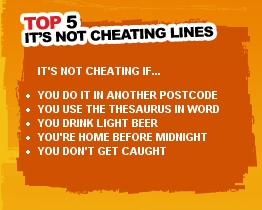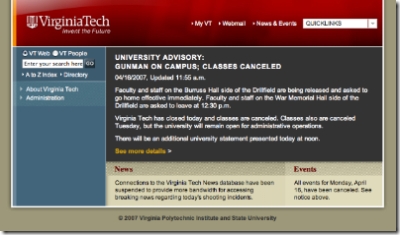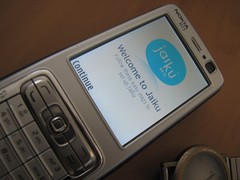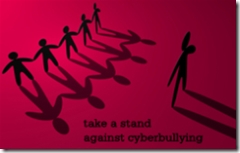Home » web2.0 (Page 17)
Category Archives: web2.0
Six Twitter Questions
Last week danah boyd posted a few questions about Twitter use. Since I answered each one in my head, I figure I’d post my answers here on the (very off) chance someone else is interested in my answers. danah’s questions are in italics …
First, the practical question. Can i quote you?
[X] Yes, and you *must* use my real name.
1. Why do you use Twitter? What do you like/dislike about it?
I love the immediacy of Twitter. I also like the fact that since Tweets are so small, people often write more personal things, letting you – over time – build a more holistic sense of them as a person not just as an academic (or whatever role that person has as their more careful public face, the face that is often more carefully maintained through other forms, such as blogging).
I don’t like the fact that, so often, I turn to Twitter only when I’m trying to procrastinate or distract myself from what I should “really” be doing!
2. Who do you think is reading your Tweets? Is this the audience you want? Why/why not? Tell me anything you think of relating to the audience for your Tweets.
I’ve got two discernable groups – firstly, Perth folks who Twitter and who knowingly form a sort of semi-web2.0 ensemble (the same folk you’d see at Perth Blog Meetups); secondly my academic and pseudo-academic ‘friends’ (and I use the quote marks since I’ve not physically met a number of the people I’d imagine in this category) who I share some interests with – be it digital culture, film, participatory culture or some combination thereof. These are both the people I imagine are reading me (or have subscribed to my Tweets) and also the people I read.
3. How do you read others’ Tweets? Do you read all of them? Who do you read/not read and why? Do you know them all?
As at 2. The only time I read new Tweets, now, is when someone I’m already reading either points to someone/something interesting or is engaged in one side of an interesting conversation and I want to hear the other half!
4. What content do you think is appropriate for a Tweet? What is inappropriate? Have you ever found yourself wanting to Tweet and then deciding against it? Why?
Inappropriate is a hard call – I’ve seen all sorts of colourful language and that seems in keeping with the immediacy and personal aspects of Twitter, but at the same time I wonder if those, aggregated, would be the sort of thing people want to be a reflection of themselves. I guess links to porn or other potentially offensive material has to be flagged as such – the use of TinyURLs means you’re less able to predict the contents of a link by it’s URL and so the onus (I think) is on the Twitterer to make it clear what they’ve linking to.
5. Are your Tweets public? Why/why not? How do you feel about people you don’t know coming across them? What about people you do know?
Mine are at present. I’m considering making them private as I’ve caught myself (only once so far) writing and then deleting a Tweet since it was venting about the workplace and the workplace could – at some distant point in the future – notice. That said, I’m never really sure how private ‘private’ turns out to be.
6. What do i need to know about why Twitter is/is not working for you or your friends?
Twitter, to me, works best in tandem with other forms. Most of the Twitterers and Twitterati I read are already bloggers, but their Tweets add a level of personality and personal depth which often isn’t visible in their blog posts (which are often more careful, especially because blogs and ‘personal profiles’ so often are synonymous in academia).
The Virginia Tech Shootings and Unintentional Citizen Journalism
I woke this morning to the news that 33 people were dead at Virginia Tech university in the US due to a gunman’s “shooting rampage” . Apart from the tragedy itself one line which struck me as odd in initial report I was reading from the BBC (and I struck, literally, hundreds more when I started working through the posts in the eight hours since I last looked at the aggregated news in Google Reader) was this:
Eyewitnesses said some students jumped from classroom windows to escape the gunfire, which triggered panic on campus.
Some of those locked down inside the university buildings were using the internet to try to glean information about what was happening and many e-mailed the BBC News website. [Emphasis added.]
Why would Virginia Tech students turn to the BBC for information on a real-time event happening around them in the United States? While the BBC was certainly a focal point in the aftermath of the 2005 London Bombings, this line struck me as just odd (and uncharacteristically self-important for the usually quite staid BBC). Looking a little further around the BBC website, I found this story from Virginia Tech student Nikolas Macko which describes the experience of staying inside one of the classrooms while gunshots could be heard nearby. The BBC was certainly quick off the mark with this story, so I guess if students didn’t find anything on the BBC, perhaps they sent their stories in by email or the other means the BBC has set up to highlight reports from everyday folk.
Reading further, Dan Gillmor of Citizen Media points out that most of the news stories on US television feature a cameraphone video taken by a VT student in which gunshots can be clearly heard, but not seen (the video is, of course, now available on YouTube, found via NewTeeVee).
A number of mainstream media outlets have also turned to blogs to find eyewitness and VT student testimonials. One blogger, ntcoolfool aka Bryce Carter, had mainstream media producers requesting help finding cameraphone videos after he posted a videoclip of police cars heading to the scene of the massacre. There was also a request from someone at the Boston Herald for Carter’s thoughts on social software, given that the paper was “wondering if online communication is the best way to stay in touch during a crisis“.
One of the things that stood out to me when reading some of the blog posts from Virginia Tech students, including Carter’s, was how people reacted when their blogged personal thoughts suddenly became mainstream media soundbites. For example, Carter later posted this:
As this blog has received international attention, I find myself wondering what the world has come to. The media watch dogs, no offense, have jumped on this story and on me for, as one anonymous user said, ‘exploit my emotions’. At this time I do not believe this is so, because to put it simply: I’m willing to share my experience. This is nothing special. I don’t deserve any credit. I went to class as any other student would. I just happened to be on the other side of campus when the shots were fired later in the day. But isn’t that just it? What is remarkable about this story is that this is the story of an average student at this great school. Stories of horror, bloodshed, and death are soon to come from the victims of this horrible catastrophe and the limelight will shine onwards, for that is what the public thirsts for.
For those that are interested, I will write a more complete narrative of my experiences of today later, once the media frenzy has died down and I have a minute to better reflect. As of the time I am writing this I have done a radio interview with BBC and talked with a reporter from the LA Times. CBC Newsworld, the Boston Herald, Current TV, and MTV have asked for interviews and further information. As I said I intend to share my experiences with everyone, but I want to reinstate that I am just an average student and I don’t want to be made into something I am not.
Furthermore, upon looking at a few of the posts made on this blog, I want to declare that I am OFFENDED that people are allowing this to become a political debate. People are dead. My friends could be dead. Forget bickering about trivia. Now is not the time or the place. It is the media’s job to report to the public these stories. Take it as you wish. I’m not the media. I’m just me.
A few minutes ago I walked in the hallway of the dorm frustrated with the constant contacts of media coming in every minute. In my arrogance and limited perspective I walked into a friends room while in discussion and yelled out “I hate livejournal!”, which, concerning the current emotions of campus, was not the best thing to do. Understandably, they kicked me out. [Link Via Washington Post Blog Roundup]
Carter, I have to say, seems to be handling his edge of the media spotlight rather well. His comments really emphasise that despite the ideals of citizen journalism, many forms of social software tend to allow ordinary folks to become more like eyewitnesses who are harassed into sharing their perspectives with the mainstream press, far more so than being intentional ‘reporters’ in their own right. That said, Carter’s commentary on the process itself will, I guess, have much more prominence in the aftermath of these tragic shootings. I suspect I might end up talking about Carter’s livejournal experience in a lecture in the near future, when trying to get students to ponder the difference between the initial and intended use of social software and online presence, versus what these textual (another other) online artifacts might, at some point, be used for.
Xeni Jardin’s post about the shootings at Boing Boing has lots of relevant links to citizen-produced commentary (much intentionally so), links and blogs and is a solid starting point if you’re looking to see how reportage about the VT Shootings — both mainstream and otherwise — has grown across the world wide web.
Finally, though, I wanted to share a screenshot posted to the Flickr Virginia Tech Shooting pool. This image is far from graphic, but really hit home because it’s the sort of notice which looks so banal, but says so much. The screenshot is from the Virginia Tech website and reads “Campus Advisory: Gunman on Campus; Classes Canceled“:
This left me wondering, if such a tragic event happened at my university, how would we react? I guess, at some level, that’s the thought that runs through most people’s minds and what makes these shootings feel so visceral to so many people – sympathy, of course, but empathy, too.
I Jaikued today … I don’t think I shall again.
I tried Jaiku today since it’s been discussed a lot recently as the ‘other’ Twitter (even though Jaiku was around first, I think).
First impressions of Jaiku – a lot more tools, more fleshed out, I like the idea of comment threads on individual messages, it’s less about popularity per se, and more about a small tight-knit group (I think). The recent explosion of interest and use of Twitter seems to have people trying Jaiku as well, but from my few hours of use, the massive influx of users has left Jaiku with more speed problems than Twitter’s recent scaling and capacity issues.
However, the appeal of Twitter for me is its simplicity … it has very few tools and the posts (Twits) are primarily self-contained. The ‘@’ reponding has evolved socially, but I don’t imagine it’ll grow to get all that complicated.
More to the point, for me, Twitter is a sometimes food and I like my procrastination (or ‘continual partial prescence’ if you must) simple and no fuss.
Apparently I’m in Vogue
 You’ll forgive the title to this post, I’ve never been able to let a good pun go and I doubt I’ll ever be able to use that one again. It’s true, though: I was interviewed about a month ago by Cathrin Shaer, a New Zealand-based writer for Vogue Australia who was writing a piece on life online. She was trying to do an awful lot in one article (talking about MySpace, Flickr, YouTube, Second Life, etc.) but somehow my name came up and I ended up talking with her for almost an hour about the complexities of interaction in different online modes. Clearly the bit that stuck was about Second Life. Here is the snippet from that interview which appeared today in ‘A life less ordinary’ (Vogue Australia, May 2007):
You’ll forgive the title to this post, I’ve never been able to let a good pun go and I doubt I’ll ever be able to use that one again. It’s true, though: I was interviewed about a month ago by Cathrin Shaer, a New Zealand-based writer for Vogue Australia who was writing a piece on life online. She was trying to do an awful lot in one article (talking about MySpace, Flickr, YouTube, Second Life, etc.) but somehow my name came up and I ended up talking with her for almost an hour about the complexities of interaction in different online modes. Clearly the bit that stuck was about Second Life. Here is the snippet from that interview which appeared today in ‘A life less ordinary’ (Vogue Australia, May 2007):
Tama Leaver, a lecturer at The University of Western Australia whose research interests include exploring how humans interact with technology, has used Second Life for business meetings: “Most of the people working in my field are spread across the globe. I’ve participated in teleconferencing, but it’s better of have a conference in Second Life because you’re all in a room together, rather than just disembodied voices.” Apparently, even if you’re meeting with a bunch of serious academics, it doesn’t matter if you look like a cartoon character. “There’s a great parallel in animated films,” Leaver explains. “We understand what’s going on in an animated character’s face — most people understanding what Shrek was saying.”
Not exactly mind-blowing stuff on my part. Also, I suspect there are a few sentences Shaer could have left in since there was somewhat more space and substance between talking about academic discussion in Second Life and Shrek (for the record, I’ve never met anyone online or offline who looks like Shrek – while the facial features might be there, no one I’ve met was actually green). That said, it’s interesting to see interest in social software spreading as far as Vogue. (Although I was a little surprised that they didn’t use any Second Life screenshots for illustration – and what they did use seemed like a bad high school art collage – perhaps the Vogue graphics people didn’t actually make it in-world).
‘Ghosts of blogging’?
In light of the recent tragic chatroom/webcam suicide, I wondered what an article “Ghosts of blogging haunt net cemetery” might have to say about the role of blogs after a blogger’s life. Alas, this has to be one of the worst, ignorant, mainstream-media puff pieces in a long time:
In the latest entry on her personal weblog, Lindsay Lohan, the hard-partying Hollywood actress, was in characteristically bubbly form. “Hey guys, I’m soooo sooo sorry I haven’t written in a while!!” she wrote. She was heading off to New York for two days of photo-shoots, then to Toronto in Canada for a week of filming, then back to Los Angeles again. The entry ended: “I just wanted to check in, I’ll try and write more … xx LL.” It has been a long wait for any Lohan fans who may be hoping for an update. That entry was posted on October 15, 2003.
Lohan’s blog has since taken its place in the internet’s fastest-growing graveyard – of an estimated 200 million blogs that have been started, then abandoned.
The extraordinary failure rate of online diaries and claims that interest in blogging will soon begin a precipitous slide are sparking an intriguing debate about the future of self-expression on the internet and whether blogs, once seen as revolutionary, are destined to become a footnote in the history of computing.
To the embarrassment of millions of internet users – from Hollywood celebrities such as Lohan, Melanie Griffith and Barbra Streisand to countless ordinary parents, workers and would-be poets – the evidence of failed diary-keeping cannot be easily erased from search engines that continue to provide links to blogs that have lain dormant for years.
This article clearly commits many of the most juvenile mistakes about writing regarding blogs — no, not all blogs are online diaries; no, celebrities who blog are no more typical of bloggers than they are of people — but even a journalist who has never read a blog should feel a little silly making the leap to describing the ‘extraordinary failure rate’ of blogs. Or are blogs, unlike regular diaries, or pretty much any other form of narrative or writing – the only form which is supposed to be endless? Blogs have been around for a long time and, like most other things, many blogs have had their natural lifespan, dictated by the purpose for which they were originally constructed. Some blogs are used in education – and thus often have a lifespan of a semester or two; some are issue-driven and may end when that issue is resolved; indeed some are diaries, but like hardcopy diaries, they tend to get left behind after a few years.
All of those gripes aside, the article did make two good points: firstly, that the exponential rise of blogging has to slow soon (because exponential means, quite literally, that there would have to be more blogs than people within a few years at recent growth rates); and secondly that citizens of a digital culture may be shifting their focus to other platforms like YouTube and MySpace. That’s not really an argument about the death of blogging, though – it’s more testimony to the maturing of the world of social software in that many more options available for those many networks of interest and friendship which life online can facilitate.
Of course, I wonder why no one writes about how many MySpace profiles are abandoned? (Far be it from me to points out that the same folk that own MySpace own The Australian).
I guess one has to ask The Australian, if blogs are on the decline, why does your blog section keep growing?
It’s a Small World After All: From Wired’s Minifesto to the Twitterati
Apparently small is the new black. This month’s Wired Magazine contains a Minifesto, celebrating the coolness of all things mini, from meals to media:
Today, media snacking is a way of life. In the morning, we check news and tap out emails on our laptops. At work, we graze all day on videos and blogs. Back home, the giant HDTV is for 10-course feasting – say, an entire season of 24. In between are the morsels that fill those whenever minutes, as your mobile phone carrier calls them: a 30-second game on your Nintendo DS, a 60-second webisode on your cell, a three-minute podcast on your MP3 player.
From YouTube’s clip culture to Apple’s iTunes (not iAlbums), it seems for the time being smaller is, in fact, better! In the world of social software, the coolest and probably the smallest is Twitter, which allows users to post entries of no more than 140 characters, sent in from the web, IM or text message and being sent out via these same three platforms to your Twitter friends. Twitter has some impressive parents, including Evan Williams (who started Blogger before is was sold to Google) and the other Obvious folk. I’ve experimented with Twitter for the past few days, and I can see the appeal of its immediacy, and the fact that you really can’t take up much time with so little space to type! From the larger blogosphere, Jill Walker has been thinking about her Twittering in terms of blogging, noting similarities and differences:
…there’s something very satisfying about logging your days like that and seeing what others are up to. It’s a blog at a different scale than this one, in a way, very short posts, but far more frequent…
The logging aspect is quite addictive, and despite the brevity of posts, reading just a few Twitters seems to build quite an intimate picture of someone. Ross Mayfield in his post ‘Twitter Tips the Tuna’ gives this succinct explanation of Twitter:
Twitter, in a nutshell, is mobile social software that lets you broadcast and receive short messages with your social network. You can use it with SMS (sending a message to 40404), on the web or IM. A darn easy API has enabled other clients such as Twitterific for the Mac. Twitter is Continuous Partial Presence, mostly made up of mundane messages in answer to the question, “what are you doing?” A never-ending steam of presence messages prompts you to update your own. Messages are more ephemeral than IM presence — and posting is of a lower threshold, both because of ease and accessibility, and the informality of the medium.
I think that notion of ‘Continuous Partial Presence’ may very well be the core of Twitter. Mayfield goes on to argue that Twitter is peaking, with the uptake rate getting higher and higher, with everyone from Joi Ito to the BBC staking their claim as Twitterati. Indeed, as Steve Rubel notes, even John Edwards who is once again campaigning to be the Democrat candidate in the US presidential elections, is using Twitter to keep in touch with his supporters.
While there are probably a lot of people who’ll see Twitter as the icon of procrastination (and I can see their point!), Liz Lawley responds to criticisms of Twitter, pointing out that these ephemeral tidbits can actually be quite important:
The first criticizes the triviality of the content. But asking “who really cares about that kind of mindless trivia about your day” misses the whole point of presence. This isn’t about conveying complex theory–it’s about letting the people in your distributed network of family and friends have some sense of where you are and what you’re doing. And we crave this, I think. When I travel, the first thing I ask the kids on the phone when I call home is “what are you doing?” Not because I really care that much about the show on TV, or the homework they’re working on, but because I care about the rhythms and activities of their days. No, most people don’t care that I’m sitting in the airport at DCA, or watching a TV show with my husband. But the people who miss being able to share in day-to-day activity with me–family and close friends–do care.
The second type of criticism is that the last thing we need is more interruptions in our already discontinuous and partially attentive connected worlds. What’s interesting to me about Twitter, though, is that it actually reduces my craving to surf the web, ping people via IM, and cruise Facebook. I can keep a Twitter IM window open in the background, and check it occasionally just to see what people are up to. There’s no obligation to respond, which I typically feel when updates come from individuals via IM or email. Or I can just check my text messages or the web site when I feel like getting a big picture of what my friends are up to.
So, for Lawley, it would appear that everyone has their own Twitterati who are more likely to be family and friends than anyone else. Thanks once again to Steve Rubel, there’s now a basic Twitter Search, so if you’re not using it already, why not explore a little and decide who might be in your Twitterati? 😉 (And feel free to add me, if you like.)
It’s Not Cheating … It’s Microsoft?!?

Microsoft Australia have a new promotional offer and new website – http://www.itsnotcheating.com.au/ – pitching Office 2007 at Australian university students. As The Age notes:
Microsoft sells the premium version of its new Office 2007 software suite for $1150, but in a new promotion it is offering the package to Australian university students for just $75. The almost 95 per cent discount for Office 2007 Ultimate is offered through a website made specifically for the promotion, itsnotcheating.com.au. It comes as Microsoft’s cash-cow office productivity suite – which has more than 400 million users worldwide and accounts for about 30 per cent of the software giant’s income – is being increasingly threatened by free alternatives. Most notable is OpenOffice, but there are also a number of web-based competitors such as Google’s Docs & Spreadsheets and Zoho Office. […] When asked why the discount was not being offered to TAFE or non-tertiary students, a Microsoft spokeswoman said: “Microsoft has targeted universities in the roll out of this three month pilot program. If the program is successful, we will look at extending the offer to TAFE students as well as K-12.”
In many ways this is a clever strategic move by Microsoft to ensure that the university students of today – and leaders of tomorrow – are thinking Microsoft when they move out of the universities. It certainly speaks to the competition coming from other options – I must admit I’m musing Google Docs more and more as their export to PDF function makes editing documents intended for the web far faster than using Word and the Acrobat plugin.
Microsoft are also try to tap the web2.0 world of blogging:
Microsoft hopes to spread the word about its offer virally by running a blogging competition, and the first prize is a Vespa GT200 scooter. “All you have to do is mention the word ‘Office’ and the link ‘www.itsnotcheating.com.au’ in your blog,” the website reads. “Winner is judged on creativity of the story.”
Of course, there is real potential for that competition to turn against Microsoft, especially when students find their new spiffy formats of Word aren’t compatible with previous versions. Then again, perhaps someone at Microsoft is either feeling ironic this week – or is rather ignorant about Microsoft’s ongoing anti-piracy war – as this ‘cool’ list appears on the competition page of the It Not Cheating website:

So … “It’s not cheating if … you don’t get caught.” That’s certainly not the message my university wants to send. Nor, I suspect, it is what Microsoft really wants to say. Rather, in the push for blogging credibility, Microsoft haven’t thought through their own campaign! It may be intended as satirical, but I suspect most people will find these attempts at being hip rather ironic!
Update (1.35pm, Tues 6 Mar 07): Long Zheng has a more robust argument about why this Microsoft initiative is a bad idea here. (Of course, all those criticisms aside, I have to admit: were I currently a student without a copy of Office, I’m pretty sure I’d be looking to get myself a $75 legal copy tomorrow!)




